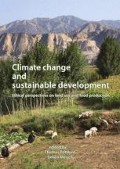Abstract
For almost 30 years there has been a scientific debate on climate change. Most of the participants agree that consensus has been reached that there is enough evidence of human causation of recent observed warming, even if this is not a completely settled matter. This body of evidence, it is claimed by the majority of scientists and politicians, is needed to understand how to protect the world from potential harms. However, there remains a minority of scientists and politicians who claim that there is no evidence for the human causation of global warming. This minority, the so-called climate change deniers, believes that policies to reduce emissions of climate-altering gases will have a devastating effect on jobs and the overall economy. In their attacks on these views of the climate change deniers, the majority not only blames them for an outright distortion of climate change science, but also claim that disinformation about the state of climate change science is extraordinarily morally reprehensible. Their argument is that climate change denial will lead to non-action in reducing climate change’s threat and will cause severe consequences for the poorest people in the world. In their view climate change deniers put the human species at risk. In this paper I will analyze and evaluate the claim of the majority that climate change denial is an ethical issue, and not only a scientific matter.
Access this chapter
Tax calculation will be finalised at checkout
Purchases are for personal use only
References
Brown, D.A. (2011). An Ethical Analysis of the Climate Change Disinformation Campaign: Is This A New Kind of Assault on Humanity? https://blogs.psu.edu/mt4/mt-tb.cgi/309657.
Garvey, J. (2008). The Ethics of Climate Change. Right and Wrong in a Warming World. Continuum, London, United Kingdom, 179 pp.
Hulme, M. (2010). Four Meanings of Climate Change. In: Skrimshire, S. (ed.) Future Ethics. Climate Change and Apocalyptic Imagination. Continuum, London, United Kingdom.
Jamieson, D. (ed.) (2001). A Companion to Environmental Philosophy. Blackwell, Oxford, United Kingdom.
Shue, H. (2001) Climate. In: Jamieson, D. (ed.) A Companion to Environmental Philosophy. Blackwell, Oxford, United Kingdom.
Singer, P. (2004). One World. Yale University Press, London, United Kingdom.
Author information
Authors and Affiliations
Corresponding author
Editor information
Editors and Affiliations
Rights and permissions
Copyright information
© 2012 Wageningen Academic Publishers
About this chapter
Cite this chapter
Gremmen, B. (2012). The ethics of climate change denial. In: Potthast, T., Meisch, S. (eds) Climate change and sustainable development. Wageningen Academic Publishers, Wageningen. https://doi.org/10.3920/978-90-8686-753-0_11
Download citation
DOI: https://doi.org/10.3920/978-90-8686-753-0_11
Publisher Name: Wageningen Academic Publishers, Wageningen
Online ISBN: 978-90-8686-753-0
eBook Packages: Biomedical and Life SciencesBiomedical and Life Sciences (R0)


